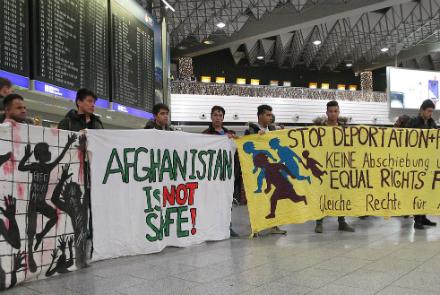Government efforts to curtail the number of Afghan refugees in Europe being deported back to their country appears to be succeeding.
The Minister of refugees and repatriation, Sayed Hussain Alemi Balkhi, said on Monday it was initially expected that over a hundred thousand Afghans were to be deported from the European countries in 2017. However, as a result of efforts by the government and other international organizations, only a few hundred were sent back to Afghanistan during this period.
He said that this year over 750 Afghans were sent back to Afghanistan, compared to the figure of only 580 migrants in 2015.
Balkhi made the remarks during a special gathering marking World Refugees Day.
The statistics of the ministry of refugees and repatriation show that over 2 million Afghan refugees were returned to their own country over the past three years from neighboring countries such as Iran and Pakistan including the European countries.
He said around 500,000 Afghans were repatriated from neighboring nations this year.
“The European Union has allocated 80 million Euro for the year 2017 and an additional 124 million Euro to help deal with the issue of returnees. We are now planning on it,” said Balkhi.
Balkhi said: “So far this year more than 528,000 Afghans have returned from neighboring Iran and Pakistan while out of 500,000 internally displaced persons last year, over 100,000 have returned.
Meanwhile, Abdullah Abdullah, the CEO of Afghanistan has said there have been some improvements in the lives of the refugees this year compared to two years before.
“Despite the fact that there are a lot of challenges internationally, particularly in the migration sphere, the international community and the donors are still focusing on Afghanistan,” said Abdullah.
“Our joint work with the EU was fruitful and the number of the returnees have declined. We are also grateful to the governments of Iran and Pakistan for providing needful facilities for returning Afghans migrants in their countries,” he further said.
Toby Lanzer, Deputy Special Representative for the United Nations Assistance Mission in Afghanistan (UNAMA), has said that those refugees who are repatriated to their own country must be provided better living conditions.
“For Afghanistan, migration is an opportunity. Five hundred thousand people returned to their homeland this year. We’re here to help and we’re ready for 2018,” said Mr. Toby Lanzer.
According to Balkhi, currently, over three million Afghan refugees are living in the neighboring countries.
The number of Afghan refugees living in Europe is estimated to be over 477,000.
Since the beginning of the year, IOM has provided more than 104,000 undocumented Afghans with post-arrival emergency assistance at its Transit Centers in the four border crossing points with Iran and Pakistan.
On 18 December 1990, the General Assembly of the United Nations adopted the international convention on the protection of the rights of migrant workers and members of their families.


